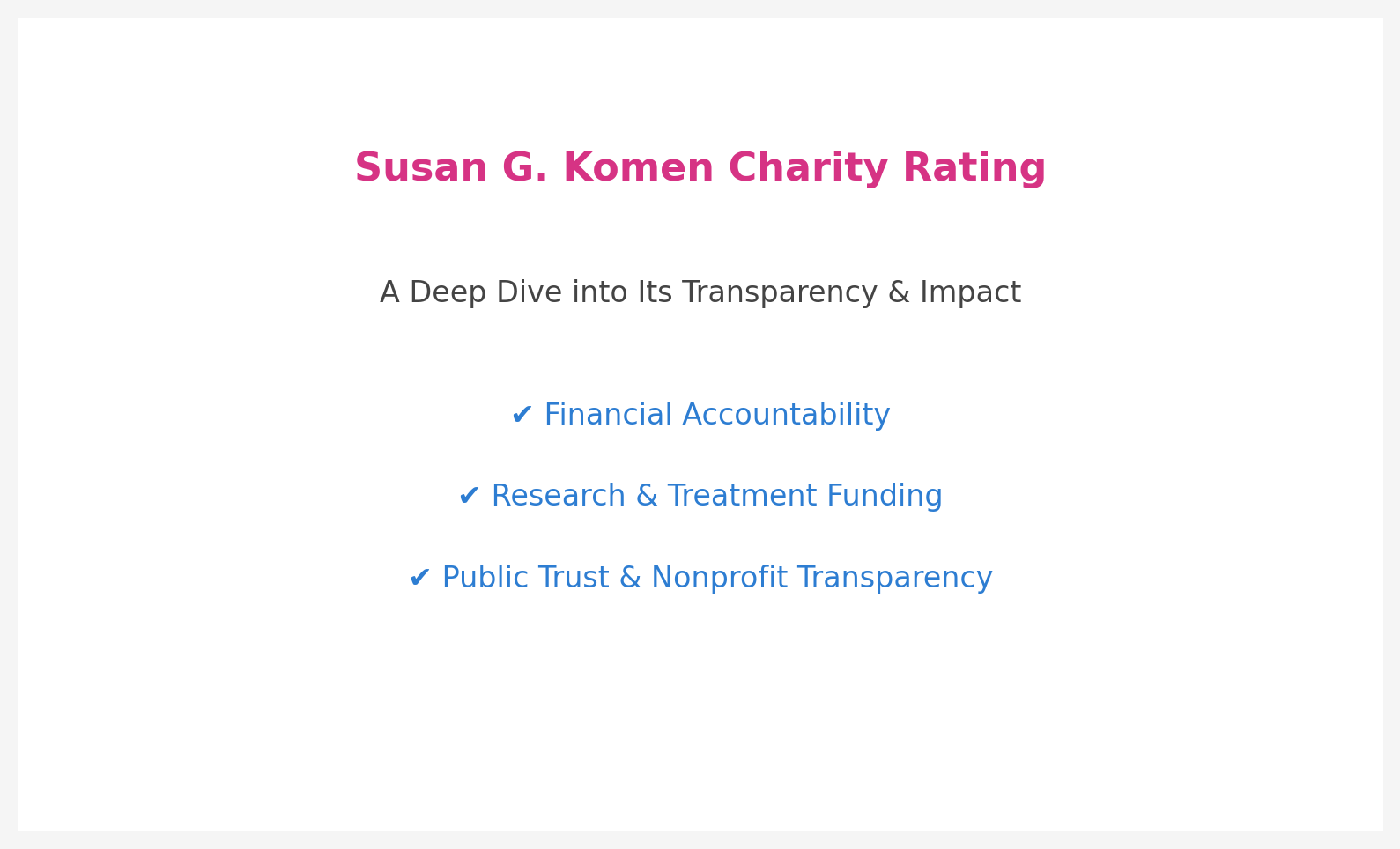NEWS
Susan Komen Charity Rating: A Dive into Its Transparency

Susan G. Komen, a leading breast cancer organization, has been both praised and scrutinized for its financial management and transparency. Charity watchdog organizations like Charity Navigator, GuideStar, and the Better Business Bureau (BBB) evaluate nonprofits based on their financial efficiency, governance, and impact. Understanding Komen’s charity ratings is essential for donors who want to ensure their money is going toward meaningful change.
How Charity Watchdogs Rate Nonprofits
Nonprofit organizations are evaluated based on various metrics, including:
-
Financial efficiency: the percentage of funds used for programs versus administrative expenses.
-
Accountability & transparency: whether the organization adheres to ethical governance practices.
-
Program effectiveness: how much of the charity’s work directly impacts the cause it supports.
-
Public trust: feedback from donors and the public about the organization’s impact.
Susan G. Komen receives mixed ratings from different watchdogs, making it crucial to analyze each aspect of its performance.
Financial Breakdown: How Susan G. Komen Spends Donations
One of the most critical factors in charity evaluation is financial transparency. Here’s a closer look at how Susan G. Komen allocates its funds:
| Category | Percentage of Expenses |
|---|---|
| Research & Treatment | 37% |
| Public Education | 20% |
| Fundraising | 14% |
| Administrative Costs | 7% |
| Patient Support | 22% |
While a significant portion goes toward research and patient support, some critics argue that administrative and fundraising costs are high compared to other cancer research organizations.
Charity Navigator’s Rating for Susan G. Komen
Charity Navigator, one of the most trusted nonprofit evaluators, assesses charities based on financial health, transparency, and accountability. As of recent years, Susan G. Komen has received an overall score that fluctuates, reflecting changes in financial management and governance.
Key highlights of Charity Navigator’s evaluation:
Strong financial management, with funds directed toward breast cancer programs.
Transparency issues raised in the past, though recent improvements have been noted.
High fundraising expenses compared to similar charities.
GuideStar’s Evaluation of Susan G. Komen
GuideStar provides insights based on IRS filings and self-reported data from nonprofits. Komen has achieved the Platinum Seal of Transparency, meaning it provides in-depth financial and operational details to the public.
However, transparency alone isn’t enough. Critics argue that the organization’s spending choices, including partnerships and marketing costs, have sometimes overshadowed its research funding efforts.
BBB Wise Giving Alliance Report on Susan G. Komen
The Better Business Bureau’s (BBB) Wise Giving Alliance evaluates nonprofits on 20 Standards of Charity Accountability, including governance, fundraising practices, and program impact.
According to BBB’s most recent report:
Komen meets most transparency and governance standards.
Concerns remain over fundraising expenditures.
Public feedback is generally positive but mixed regarding financial efficiency.
Criticism and Controversies Surrounding Susan G. Komen
Despite its role in breast cancer research and awareness, Susan G. Komen has faced criticism over the years.
1. High Fundraising Costs
Komen’s fundraising expenses have drawn criticism, with some arguing that a more significant percentage should go directly toward breast cancer research rather than marketing and administration.
2. Planned Parenthood Controversy
In 2012, Komen briefly pulled funding from Planned Parenthood, sparking public backlash. Although the decision was reversed, the controversy led to concerns about the organization’s leadership and decision-making process.
3. Pinkwashing Accusations
The term “pinkwashing” refers to companies and organizations that use breast cancer awareness for marketing without making significant contributions to the cause. Komen has been accused of partnering with corporations that sell products linked to cancer risks, raising ethical concerns.
The Impact of Susan G. Komen’s Work
Despite criticisms, Susan G. Komen has played a major role in advancing breast cancer awareness and treatment. Some of its significant contributions include:
-
Funding over $1 billion in breast cancer research.
-
Providing financial assistance and support programs for patients.
-
Raising public awareness about breast cancer detection and treatment.
Many survivors credit Komen for life-saving awareness campaigns and early detection efforts.
Also read: Jerusalem Prayer Team Charity Rating: Is It Trustworthy
Should You Donate to Susan G. Komen?
If you’re considering donating to Susan G. Komen, ask yourself:
Does Komen’s mission align with your values?
Are you comfortable with its fundraising and administrative costs?
Would you rather support organizations that focus solely on research funding?
Alternative Breast Cancer Charities
If you’re looking for other breast cancer charities with different funding models, consider:
-
Breast Cancer Research Foundation (BCRF): focuses primarily on research funding.
-
National Breast Cancer Foundation: Provides free mammograms and support programs.
-
Dr. Susan Love Foundation: Dedicated to innovative breast cancer research.
Conclusion
Susan G. Komen remains one of the most recognizable breast cancer charities, with significant contributions to research and awareness. However, donors concerned about fundraising efficiency may prefer organizations that allocate a higher percentage of funds directly to research.
Before donating, research multiple breast cancer charities to ensure your contributions align with your values and make the most impact.
FAQs
Is Susan G. Komen a trustworthy charity?
Yes, Susan G. Komen meets most nonprofit accountability standards, but some donors question its fundraising expenses and past controversies.
How much of my donation goes toward breast cancer research?
Approximately 37% of donations go directly to research, while the rest supports awareness campaigns, fundraising, and administrative costs.
Why is Susan G. Komen criticized for its spending?
Critics argue that Komen allocates a high percentage of funds to marketing and fundraising rather than research and patient care.
Has Susan G. Komen improved its financial transparency?
Yes, in recent years, Komen has taken steps to improve transparency, earning recognition from GuideStar and BBB Wise Giving Alliance.
Are there better breast cancer charities to support?
It depends on your priorities. If you prefer funding research directly, the Breast Cancer Research Foundation may be a better choice.
Can I trust Susan G. Komen’s pink ribbon campaigns?
Some pink ribbon products support research, but others are criticized for “pinkwashing.” Always verify where the proceeds go before purchasing.
-

 HUMAN RIGHTS5 months ago
HUMAN RIGHTS5 months agoMercy Ships Scandal: Unraveling the Truth Behind the Allegations
-

 SOCIAL AWARENESS5 months ago
SOCIAL AWARENESS5 months agoIs Helping Hands Legit? Unveiling the Truth Behind This Organization
-

 HUMAN RIGHTS6 months ago
HUMAN RIGHTS6 months agoHuman Rights Issues: Challenges and Progress in a Globalized World
-

 SOCIAL AWARENESS5 months ago
SOCIAL AWARENESS5 months agoNational Charity League: A Legacy of Leadership and Service
